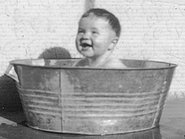Dr Michael Trainor
Australia | ICCJ 1st Vice President

Describe how you became involved in interreligious dialogue and in the ICCJ:
I first became interested in the relationship between Christianity and Judaism when I began post-graduate study at Boston College en route to my doctorate. My collegial friendship with Fr John Pawlikowski was fundamental to my growth in interest in Jewish-Christian matters and dialogue. His 1982 book, Christ in the Light of the Christian-Jewish Dialogue, created a tectonic theological and intellectual shift in my Catholic understanding. Dr Mary Boys later introduced me to the importance of this dialogue in the wake of Vatican II. My biblical studies in New Testament further cemented the importance of understanding the relationship between Judaism and Christianity, especially as I began to see the anti-Jewish or perhaps anti-Semitic bias within key New Testament texts. This professional engagement with the study and bias present in the New Testament which I was assigned to teach later at our local university, coupled with a study of the watershed Vatican II document, Nostra Aetate, local involvement in the establishment of the first Jewish-Christian dialogue in Adelaide, South Australia—all contributed to deepen my involvement in interreligious dialogue. Soon I became attracted to the vision and work of the ICCJ.
Tell us something about your first ICCJ conference:
My first ICCJ conference was the 2007 Sydney conference. There I re-established a network with great local, national and international Jewish-Christian dialogue practitioners. This encounter inspired me.
Tell us briefly about your most powerful ICCJ memory:
I attended the 2011 ICCJ Krakow conference. I found myself standing next to Rabbi Ehud Bandel as he prayed the Jewish prayer for the dead in Auschwitz-Birkenau before the remains of the gas chambers where his relatives were executed.
How do you see the ICCJ evolving in the future:
I see the importance of continuing to offer reflections and insights on what is happening about interreligious matters, especially those that affect Jewish-Christian relations, from this part of the globe, the Southern Hemisphere and Oceania. The ICCJ has a focus on Europe and North American. I see the importance of bringing other voices, especially from the global South, to this conversation, and to honour the ‘I’ of the ICCJ.
What/which questions are the closest to your heart:
• What are the reasons that keep people from deeply listening to each other?
• How can we respond effectively as a Council to the growing environmental crisis?
• What is the deep religious quest that draws us to our common humanity?
• In what ways can we work towards genuine dialogue that breaks down barriers of misunderstanding and assists the process of peace?
What is the greatest challenge you think the ICCJ will face in the coming years:
Ensuring that the processes of genuine or authentic dialogue continue between Jews and Christians to model interreligious dialogue.
What advice would you give to someone who is just getting involved in the ICCJ:
Listen, Read, reflect, and keep a sense of humour
